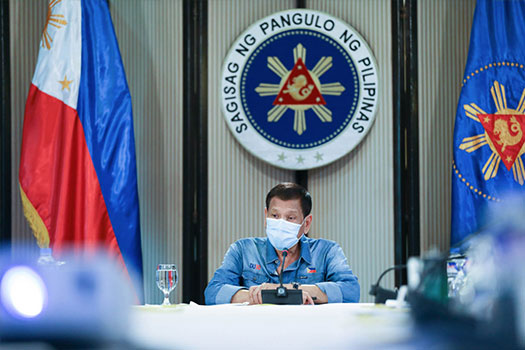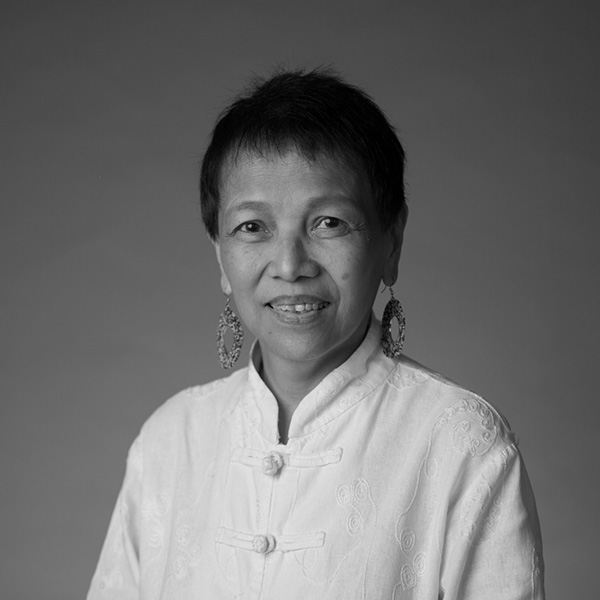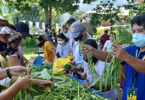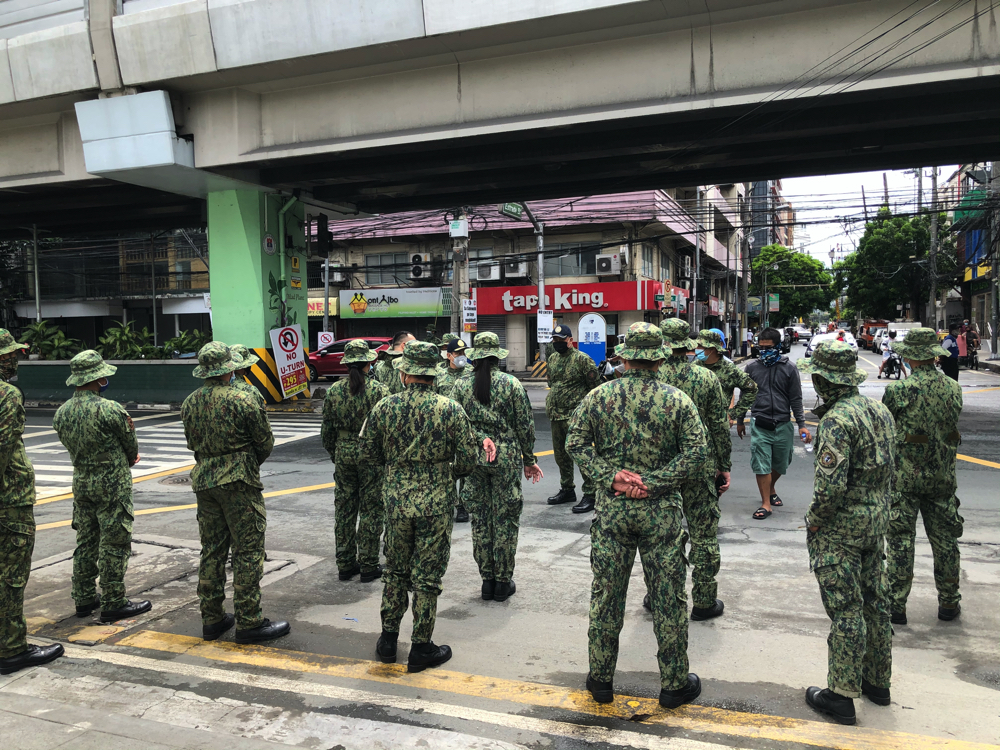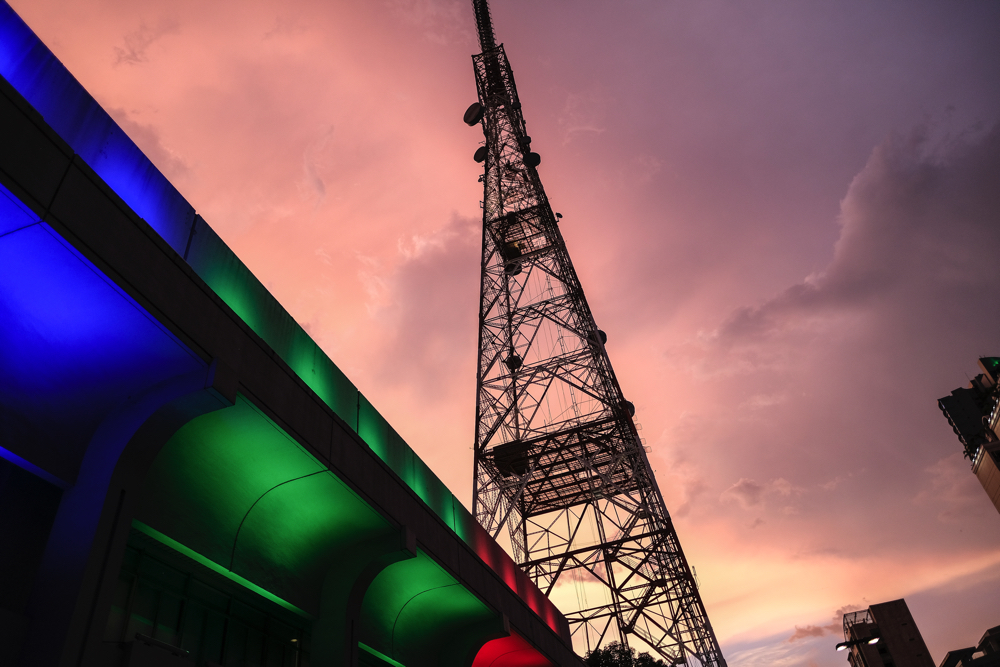As the coronavirus pandemic continues to ravage the Philippines and the rest of the world, President Rodrigo R. Duterte has threatened to impose martial law to instill discipline on people breaking the quarantine law in the country’s largest island of Luzon. “Shoot them dead,” he earlier instructed the military and police in a televised address. “Dead. Instead of causing chaos, I’ll just bury you.” His statement was in reaction to the arrest of some protesters in Quezon City in Metro Manila who were demanding for the immediate release of food aid by the local government (Gregorio 2020). “I am warning everybody and putting notice [to the] armed forces and the police, I might declare martial law,” he later reiterated after two soldiers were reportedly killed by armed New People’s Army (NPA) guerillas in Aurora province (CNN Philippines 2020).
It is not the first time that Duterte threatened to impose the martial law powers of the presidency. In the first half of his presidential term, he placed the entire southern island of Mindanao under military control for two and a half years (with the approval of Congress) to suppress terrorists from the Islamic State (ISIS) affiliate Maute group who laid siege to Marawi City in Lanao del Sur (Gotinga 2019). It is also not the first time he ordered a “shoot-to-kill” order to the police. Since he assumed office in 2016, his administration has pursued a bloody drug war that has resulted in the reported extra-judicial killings recently estimated at 27,000 (The Economist 2020). A couple of weeks after Duterte issued his latest order, a policeman shot and killed a discharged army soldier who had Post-Traumatic Stress Disorder (PTSD) for alleged quarantine violations (Mangosing 2020).
Staunch critics have accused Duterte of transgressing the boundaries of liberal principles by cowing the courts (most notably the removal of Supreme Court Chief Justice Maria Lourdes Sereno in a highly irregular fashion by his allies), attempting to intimidate independent government agencies (particularly the Commission on Human Rights and the Office of the Ombudsman), maneuvering to have his critics criminally charged or jailed (Vice President Leni Robredo and Senator Antonio Trillanes facing criminal complaints and Senator Leila de Lima already jailed), attempting to silence media (cracking down on Rappler and ABS-CBN), and attacking big business (the Ayala family, tycoon Manny Pangilinan, and the Lopezes) (Thompson 2019; Pangue 2020; Reed 2020).
But for his diehard supporters, Duterte is the embodiment of their “tatay” or daddy — a strict father of the nation with only the interest of the Filipino people at heart (Aquino 2019). They are a constituency of the “populist public” who are frustrated, angered, and skeptical of the “hypocrisy” of liberal reformism characterized by the previous presidential administration said to be dominated by the “elites” and the “oligarchs.” As one Duterte supporter colorfully puts it, “[we] support Duterte because [we] are Duterte” (Arguelles 2019:431).
The current crisis may provide a temptation for Duterte to further transgress the limits of presidential powers
For some observers, the ongoing COVID-19 pandemic is a perfect opportunity for strongmen and autocrats to further consolidate power and control amid a great global humanitarian crisis (Lührmann et al. 2020). Indeed, there is an apparent trade-off between the restriction of individual freedoms and the need for government to enforce these restrictions by a command to contain the spread of the deadly virus. However, there are fears that liberty, once taken, especially by the state, might be difficult to restore. The current crisis may provide a temptation for Duterte to further transgress the limits of presidential powers by the implementation of the particular provisions of the “Bayanihan to Heal as One Act” — the law that grants him special powers to address the COVID-19 crisis (Holmes and Hutchcroft 2020).
For weeks, the police, petty bureaucrats, and village officials have been cracking down on violators of the imposed enhanced community quarantine under the Bayanihan Law. Around 130,000 quarantine violators have been so far apprehended (ABS-CBN 2020b). Quarantine violators have also been subjected to verbal abuse and physical punishments, according to some human rights groups (Castaneda 2020). In a developing country like the Philippines, where a large number of the urban population live in cramped slum communities and subsist as daily wage earners, social distancing and work-from-home arrangements are privileges reserved for the middle and upper classes of Philippine society. Slow and sometimes missed delivery of crucial government food support and subsidies to the poor and vulnerable sectors have led to hunger and desperation that further threatens social order in the metropolis (Gutierrez 2020). Nonetheless, the well-heeled have not been entirely spared as the police barging into exclusive villages and condominiums in search of quarantine violators has also been reported (ABS-CBN News 2020a; De Leon 2020).
So far, the National Bureau of Investigation (NBI) has issued more than a dozen subpoenas to social media users who aired their sentiments against the government’s response to the COVID-19 crisis (Patag 2020). The subpoenas cite Article 154 of the Revised Penal Code, which punishes the publication of “any false news which may endanger the public order, or cause damage to the interest or credit of the State.” The Bayanihan Law, which took into effect March 26, punishes under Section 6(6) the “creating, perpetuating, or spreading false information regarding the [COVID-19] crisis on social media and other platforms, such information having no valid or beneficial effect on the population, and are clearly geared to promote chaos, panic, anarchy, fear, or confusion” (Buan 2020). However, the definition of false news is nebulous, and its determination is left to the whims of law enforcers. Even Overseas Filipino Workers (OFWs), which is among Duterte’s main base of political support, are not spared from this draconian provision. A Filipina caregiver in Taichung, Taiwan, was recently threatened to be reported for deportation by her very own Philippine Labor Attaché for alleged cyber libel over her social media posts against Duterte (Ramos 2020).
Given the uncertainties brought about by the COVID-19 crisis and the possible threat to social order in its aftermath, it just might be easier for Duterte to wield the iron fist of an imperious presidency. But he must heed the lessons of history. Viewed from the perspective of political time, past presidents who transgressed their presidential powers have done so at great political risks—even at the cost of their presidency.
The Myth of the Strong President
As a political institution, the Philippine presidency has been rendered enough constitutional power to have a formal semblance of a “strong presidency.” Thus, strong Philippine presidents appear to rule over a weak state malleable to the presidential whim and vulnerable to societal pressure. The Philippine presidency is a clear case of what Latin American political scientist Guillermo O’Donnell (1994) called a “delegative democracy” with little accountability, limited capacity and professionalism of the administrative and security apparatuses, and the lack of autonomy vis-à-vis powerful domestic and foreign political actors.
Yet, theories of “strong societies, weak states” (Migdal 1988) leave open the question of why in a developing country such as the Philippines a strong presidency nests within a weak state. It also does not explain the dangers to Philippine democracy posed by imperious presidents who push beyond even these limited constraints or by societal elites who imperil a freely and fairly elected president. Because a weak state lacks sufficient autonomy from society, powerful elite strategic groups can coalesce to bring down a president they oppose. In such a situation, the president is at the mercy of societal elites because of the inability of state institutions to uphold constitutional procedures. In the context of a weak state, even a once apparently “strong” presidency can become susceptible to a societal challenge.
A forthcoming book this writer is co-authoring with Mark R. Thompson of the City University of Hong Kong argues that not all Philippine presidents have been equally strong, and some have proved so at the risk that they have been overthrown extra-constitutionally. Some have been vulnerable to serious elite-military challenge with one post-Marcos president being ousted and two other facing repeated coup attempts by disgruntled military elements backed by key politicians, business and religious leaders, and civil society activists. We also argue that the relational theory of presidential regimes situated in “political time” adapted from Stephan Skowronek’s study (1997, 2010) of the U.S. presidency provides a more differentiated account of presidential strength and vulnerability in the Philippines within a weak state.
We assert that Philippine presidents govern in accordance with, or in opposition to an existing political configuration (or regime) consisting of a prevailing political narrative, powerful elite strategic groups, and key state institutions. Where a president finds her or himself in “political time,” the stage in the life cycle of a political configuration, strongly influences how “strong” or “endangered” their presidency proves to be within a weak state malleable to presidential whim but also susceptible to societal pressure determining whether democratic norms are upheld or undermined.
Narrative, Strategic Groups, and the State
In the Philippines, a presidency can be a prequel or a sequel to an ongoing political narrative. Given the absence of ideological contestation and programmatic political parties in the country, we speak of political narratives as the “stories presidents tell.” These narratives serve to coalesce support from the dominant strategic interest groups whose backing can make or break a presidency. Thus, a “strong” Philippine president acting as “patron-in-chief” can dominate a “weak” state through limited horizontal accountability to other branches of government and, because of weak parties, a lack of strong vertical accountability as well. But the relative autonomy of the strategic groups in the state, particularly the military, limits how much control the president may ultimately be able to exercise over the state apparatus itself.
Presidents have been strong when they have clear political narratives and the support of powerful strategic groups including the Catholic church, business oligarchs, and civil society activists as well as the blessing of (or criticism) by foreign powers (particularly the U.S. but increasingly China) which may strengthen or weaken societal challenges. Also, a strong president exercises control over the military and, if they have “transgressive,” illiberal intentions, can remove even the limited constraints on presidential power both nationally (the courts and Congress) and locally (by undermining the power of local politicians). “Imperious” presidents often use their massive patronage resources and control of the bureaucracy to overrun limited legislative and legal constraints, further weakening or even destroying democracy.
On the other hand, some presidents have proven susceptible to societal challenge when their discourse has become discredited, strategic elites have turned against them, and they have lost control of the military and even found Congress and the courts turn against them. Even when a president is personally popular, if located in the wrong place in “political time,” the dominant political order may prove disjunctive, leading to a change in the political order. “Imperiled” presidents have either had their political narrative discredited, making them highly unpopular or losing them the support of most business oligarchs, Catholic church bishops, key activists, and even the military command.
The Narrative Trap
Narratives are stories that weave ideas and events in a meaningful way. From running in a national campaign to delivering the inaugural address, a president must tell a compelling story. Thus, in the context of Philippine politics, presidential regimes consist of quasi-programmatic, emotive narratives in election campaigns and a governance script that binds together a coalition of strategic interests within a particular institutional context. Presidents are also embedded in a political order against which the plausibility of their political narratives is judged. A “narrative trap” occurs when a governing script “stories” diverges too dramatically from political reality resulting in loss of support or even severe antagonism from the critical strategic groups in the country.
After two decades in power, the ironclad grip of the dictator Ferdinand Marcos was gradually eroded by the sight a sick and feeble husk of a strongman who failed in his promise “to make this country great again” and instead robbed the country blind. The country’s first populist president, Joseph Estrada, closely identified with the poor (“Erap para sa mahirap” (Erap for the Poor)) but failed to win the support of the most critical strategic groups – traditional big business and the Catholic Church – and lost the support of the military and key civil society groups triggered by a series of corruption scandals. Both were ousted by people power uprisings.
Gloria Macapagal-Arroyo’s narrative of building a “Strong Republic” was undermined by accusations of electoral fraud and major corruption scandals. She became, in terms of popular teleserye (television series), the “kontrabida” of Philippine politics – the villain, full of pride and greed. But she survived her tumultuous term in office through free-flowing patronage, proficient management of the economy, and adept handling of crisis situations (Velasco and Saludo 2010).
In the beginning, it seemed that her former student and successor, Noynoy Aquino, could do no wrong. Noynoy promised to take a “straight path” (“matuwid na daan”) to clean up corruption, which he also claimed would eradicate poverty (“kung walang corrupt, walang mahirap”(if there’s no corruption, there’s no poverty)). However, his perceived mobilization of clientelistic tactics, such as pork-barrel politics to push for his anti-corruption agenda, has exposed the limits of the liberal reformist order founded by his mother, Cory Aquino, in the aftermath of the 1986 EDSA people power uprising.
The failure of the liberal reformist political order to implement much needed social and political reforms and strengthen state capacity (most noticeably in the criminal justice system and disaster management) fueled a “politics of anger” that Duterte was able to tap into during the 2016 election (Teehankee and Thompson 2016). Duterte (and Donald Trump in the United States) has embodied “performative populism”—a style of populism in the age of television and digital media that draws on a “repertoire of performance” and builds a relationship between the leader as a performer and the follower as the audience (Moffitt 2016; Magcamit and Arugay 2017). Duterte was able to tap into the “politics of anger” fueled by the general sense of frustration among the voters and the growing desire for a strong leader in restoring law and order. The anger found form in a movement that gravitated around the anti-establishment and unorthodox mayor from the South who promised the coming of real change (“tunay na pagbabago”) (Teehankee 2017).
But just like his predecessors, Duterte is now facing his own narrative trap. Ironically, just like Noynoy Aquino, he scored a major victory in the midterm elections and has enjoyed sustained popularity and high approval ratings in the surveys. And similarly, he is at the point in his term where he is faced with a crisis situation that threatens the legacy of his administration.
—”#OustDuterte” trended on Twitter worldwide with almost 500,000 tweets overwhelming even his online defenders (Tomacruz and Hapal 2020)
The COVID-19 pandemic crisis has become an unfamiliar “enemy” for him and his populist counterparts around the world. It is difficult to sustain a “people” versus “the elite” narrative against a viral and existential threat. One cannot merely “discipline” the virus. And the people are afraid, hungry, and dying. He also insists on maintaining his close ties with China, at a time where the international community is demanding accountability and even compensation for China’s mishandling of the virus outbreak in Wuhan. His “shoot them dead” remark triggered a considerable push back on social media—”#OustDuterte” trended on Twitter worldwide with almost 500,000 tweets overwhelming even his online defenders (Tomacruz and Hapal 2020).
Nonetheless, his ardent supporters insist he is the right person for the job (Tiglao 2020). His Inter-Agency Task Force for the Management of Emerging Infectious Diseases (IATF-EID) is composed of health practitioners, technocrats, and business representatives, headed by the Health Secretary. Another body composed of former military personnel, the National Task Force (NTF) COVID-19 is tasked to implement the National Action Plan (NAP) to manage the spread of the virulent disease in the country. Duterte repeatedly stated that he will “tap on the military” to “instill order” in the fight against the coronavirus (Tomacruz 2020). Only time will tell whether his handling of the COVID-19 crisis will finally repudiate the EDSA narrative, or he will be another failed populist challenger.
28 April, 2020
References
- ABS-CBN News. 2020a. “Cops allegedly trespass into Taguig condo, accost residents over COVID-19 lockdown violations.” ABS-CBN News, 20 April, 2020. https://news.abs-cbn.com/news/04/20/20/cops-trespass-pacific-plaza-towers-shout-accost-residents-lockdown-coronavirus.
- ABS-CBN News. 2020b. “No more warnings: PNP to make arrests in ‘martial law-type’ lockdown – chief.” ABS-CBN News, 20 April, 2020. https://news.abs-cbn.com/video/news/04/20/20/no-more-warnings-pnp-to-make-arrests-in-martial-law-type-lockdown-chief.
- Aquino, Norman P. 2019. Tatay Digong’ thrives on pathos to keep rock-star status.” BusinessWorld, 22 July, 2019. https://www.bworldonline.com/tatay-digong-thrives-on-pathos-to-keep-rock-star-status/.
- Arguelles, Cleve. 2019. “‘We are Rodrigo Duterte’: dimensions of the Philippine populist publics’ vote.” Asian Politics and Policy 11(3): 417-437. https://doi.org/10.1111/aspp.12472
- Bange, Jene-Anne. 2020. “Media and lawfare: Journalists ‘woke up to a storm’ under Duterte administration,” Rappler, 22 February, 2020. https://www.rappler.com/move-ph/252414-media-lawfare-journalists-under-attack-duterte-administration.
- Buan, Lian. 2020. “NBI summons ‘more than a dozen’ for coronavirus posts.” Rappler, 2 April, 2020. https://www.rappler.com/nation/256746-nbi-summons-more-than-dozen-people-social-media-coronavirus-posts.
- Castaneda, Jason. 2020. “Say a prayer for lockdown victims in the Philippines.” Asia Times, 15 April, 2020. https://asiatimes.com/2020/04/say-a-prayer-for-lockdown-victims-in-the-philippines/.
- CNN Philippines Staff. 2020. “Duterte threatens to declare martial law if ‘lawlessness’ of NPA continues.” CNN Philippines, 24 April, 2020. https://cnnphilippines.com/news/2020/4/24/duterte-lawlessness-martial-law.html.
- De Leon, Marguerite. 2020. “Man in private village assaulted, nearly arrested without warrant by Makati police.” Rappler, 27 April, 2020. https://www.rappler.com/nation/259129-man-private-village-assaulted-nearly-arrested-without-warrant-makati-police?fbclid=IwAR1N5zf2HhZSOvfz1iUJacQW8QGQDD6pe4GiYHRGEKWmjHVQxX50fILPFx0.
- Gotinga, JC. 2019. “After 2 and a half years, martial law ends in Mindanao.” Rappler, 31 December, 2019. https://www.rappler.com/nation/248253-martial-law-mindanao-ends-december-31-2019.
- Gregorio, Xave. 2020. “Duterte tells police, military to shoot unruly quarantine violators.” CNN Philippines, 1 April, 2020. https://www.cnnphilippines.com/news/2020/4/1/Rodrigo-Duterte-police-military-shoot-unruly-quarantine-violators.html.
- Gutierrez, Jason. 2020. “‘Will we die hungry?’ A teeming Manila slum chafes under lockdown.” The New York Times, 15 April, 2020. https://www.nytimes.com/2020/04/15/world/asia/manila-coronavirus-lockdown-slum.html.
- Holmes, Ronald D. and Paul D. Huthcroft. 2020 “A failure of execution.” Inside Story, April 4, 2020. https://insidestory.org.au/a-failure-of-execution/.
- Lührmann, Anna, Amanda B. Edgell, and Seraphine F. Maerz. 2020. “Pandemic Backsliding: Does Covid-19 Put Democracy at Risk?” V-Dem Institute Policy Brief 23. https://www.v-dem.net/media/filer_public/52/eb/52eb913a-b1ad-4e55-9b4b-3710ff70d1bf/pb_23.pdf
- Magcamit, Michael I and Aries A. Arugay. 2017. “Rodrigo Duterte and making of a populist demigod: part 1.” IAPS Dialogue, 17 March. https://iapsdialogue.org/2017/03/17/rodrigo-duterte-and-the-making-of-a-populist-demigod-part-1/.
- Mangosing, Frances. 2020. “Ex-soldier shot dead by cop in QC laid to rest with military honors.” Inquirer. Net, 26 April, 2020. https://newsinfo.inquirer.net/1264964/ex-soldier-shot-dead-by-cop-in-qc-laid-to-rest-with-military-honors.
- Migdal, Joel S. 1988. Strong Societies, Weak States: State-Society Relations and State Capacities in the Third World Princeton: Princeton University Press.
- Moffit, Benjamin. 2016. The Global Rise of Populism. Stanford: Stanford University Press.
- O’Donnell, Guillermo. 1994. “Delegative Democracy.” Journal of Democracy 5 (1): 55-69. https://doi.org/10.1353/jod.1994.0010
- Pangue, Jene Anne. 2020. Media and lawfare: Journalists ‘woke up to a storm’ under Duterte administration.” Rappler, 22 February, 2020. https://www.rappler.com/move-ph/252414-media-lawfare-journalists-under-attack-duterte-administration.
- Patag, Kristine Joy. 2020. “NBI going after social media users who criticize government, too.” Philippine Star, 2 April, 2020. https://www.philstar.com/headlines/2020/04/02/2005013/diokno-nbi-going-after-social-media-users-who-criticize-government-too.
- Ramos, Christia Marie. 2020. “MECO exec apologizes to Taiwan over OFW deportation issue.” Inquirer.Net, 29 April, 2020. https://globalnation.inquirer.net/187323/meco-exec-apologizes-to-taiwan-over-ofw-deportation-issue.
- Reed, John. 2020. “Philippines: Rodrigo Duterte takes aim at the oligarchs.” Financial Times, 23 February, 2020. https://www.ft.com/content/c295d548-51b0-11ea-90ad-25e377c0ee1f.
- Skowronek, Stephen. 1997. The Politics Presidents Make: Leadership from John Adams to Bill Clinton. Cambridge, Mass: The Belknap Press of Harvard University Press.
- Skowronek, Stephen. 2010. Presidential Leadership in Political Time: Reprise and Reappraisal. Lawrence, Kan.: University Press of Kansas.
- The Economist. 2020. “Shoot-to-kill in the Philippines Rodrigo Duterte’s lawless war on drugs is wildly popular.”The Economist, 20 February, 2020. https://www.economist.com/briefing/2020/02/20/rodrigo-dutertes-lawless-war-on-drugs-is-wildly-populra.
- Teehankee, Julio C. 2017. “Was Duterte’s rise inevitable?” In Curato, N. (ed.) A Duterte reader: critical essays on Rodrigo Duterte’s early presidency. Quezon City: Ateneo de Manila University Press/Bughaw.
- Teehankee, Julio C. and Thompson, Mark R. 2016. “The Vote in the Philippines: Electing a Strongman.” Journal of Democracy 27 (4): 124-134. https://doi.org/10.1353/jod.2016.0068
- Thompson, Mark R. 2019. “The rise of illiberal democracy in the Philippines: Duterte’s early presidency.” In From Aquino II to Duterte (2010-2018): change, continuity—and rupture, edited by Imelda Deinla and Björn Dressel. Singapore: ISEAS-Yusof Ishak Institute.
- Tiglao, Rigoberto D. 2020. “Strong states – yes, authoritarian states – save lives.” The Manila Times, 27 March, 2020. https://www.manilatimes.net/2020/03/27/opinion/columnists/topanalysis/strong-states-yes-authoritarian-states-save-lives/707006/.
- Tomacruz, Sofia. 2020. “What we know so far: PH ‘National Action Plan’ on the coronavirus outbreak.” Rappler, 27 March, 2020. https://www.rappler.com/newsbreak/iq/256033-things-to-know-philippines-national-action-plan-coronavirus-outbreak
- Tomacruz, Sofia and Don Kevin Hapal. 2020. “Online outrage drowns out Duterte propaganda machine.” Rappler, 24 April, 2020. https://www.rappler.com/newsbreak/in-depth/258827-coronavirus-response-online-outrage-drowns-duterte-propaganda-machine.
- Velasco, Renato S. and Ricardo L. Saludo. 2010. Beating the odds: the Philippines stands up to terror, drugs, dreadful disease, coup d’etat, economic storms and intractable conflict at the gates of the 21st century. Manila: Future Templates Enterprises.
Julio Cabral Teehankee is professor of political science and international studies at the International Studies Department, De La Salle University, Manila, Philippines. At the time of writing he was a Visiting Research Scholar at the Center for Southeast Asian Studies, Kyoto University, Japan.
Citation
Julio Cabral Teehankee. 2020. “Duterte’s COVID-19 Powers and the Paradox of the Philippine Presidency” CSEAS NEWSLETTER, 78: TBC.

